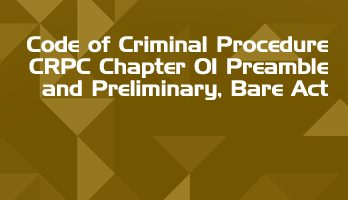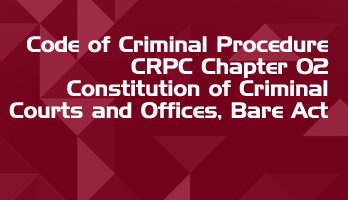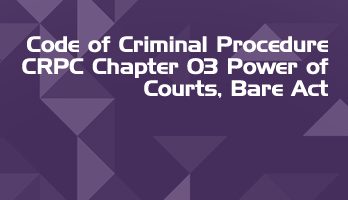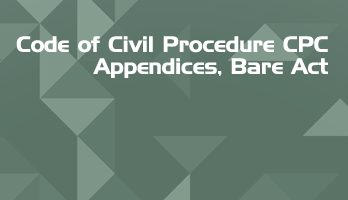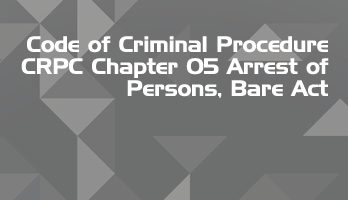A 'Bare act' is the actual legislation passed by the Parliament of India. Generally, an act sets out the high level legal and policy principles applicable to the subject matter of the law.
Most acts are accompanied by 'subsidiary legislation' such as rules, regulations, notifications and orders; which address the actual implementation detail of the act.
Free Full Course Available on LawMint's YouTube Channel
How to Land Your Dream LLB Internship in a Top Law Firm
- Part 1 - Introduction
- Part 2 - Internship Planning
- Part 3 - Internship Research
- Part 4 - Building Your Profile
- Part 5 - The Email
- Part 6 - The Resume
- Part 7 - The Cover Letter
- Part 8 - The Interview
- Part 9 - Self Development
Practical and comprehensive course, with real examples and step-by-step analysis of the complete internship application process. Check out LawMint's YouTube channel now!
Code of Criminal Procedure, 1973
Chapter 26 – Provisions As To Offences Affecting The Administration Of Justice
Section 340 – Procedure in cases mentioned in section 195
- When upon an application made to it in this behalf or otherwise any Court is of opinion that it is expedient in the interest of justice that an inquiry should be made into any offence referred to in clause (b) of Sub – Section (1) of section 195, which appears to have been committed in or in relation to a proceeding in that Court or, as the case may be, in respect of a document produced or given in evidence in a proceeding in that Court, such Court may, after such preliminary inquiry, if any, as it thinks necessary, –
- record a finding to that effect;
- make a complaint thereof in writing;
- send it to a Magistrate of the first class having jurisdiction;
- take sufficient security for the appearance for the accused before such Magistrate, or if the alleged offence is non – bailable and the Court thinks it necessary so to do send the accused in custody to such Magistrate; and
- bind over any person to appear and give evidence before such Magistrate.
- The power conferred on a Court by Sub – Section (1) in respect of an offence may, in any case where that Court has neither made a complaint under Sub – Section (1) in respect of that offence nor rejected an application for the making of such complaint, be exercised by the Court to which such former Court is subordinate within the meaning of Sub – Section (4) of section 195.
- A complaint made under this section shall be signed, –
- where the Court making the complaint is a High Court, by such officer of the Court as the Court may appoint;
- in any other case, by the presiding officer of the Court or by such officer of the Court as the Court may authorise in writing in this behalf.
- In this section, “Court” has the same meaning as in section 195.
Section 341 – Appeal
- Any person on whose application any Court other than a High Court has refused to make a complaint under Sub – Section (1) or Sub – Section (2) of section 340, or against whom such a complaint has been made by such Court, may appeal to the Court to which such former Court is subordinate within the meaning of Sub – Section (4) of section 95, and the superior Court may thereupon, after notice to the parties concerned, direct the withdrawal of the complaint or, as the case may be, making of the complaint which such former Court might have made under section 340, and if it makes such complaint, the provisions of that section shall apply accordingly.
- An order under this section and subject to any such order, an order under section 340, shall be final, and shall not be subject to revision.
Section 342 – Power to order Court
Any Court dealing with an application made to it for filing a complaint under section 340 or an appeal under section 341, shall have power to make such order as to costs as may be just.
Section 343 – Procedure of Magistrate taking cognizance
- A Magistrate to whom a complaint is made under section 340 or section 341, shall, notwithstanding anything contained in Chapter XV proceed, as far as may be, to deal with the case as if it were instituted on a police report.
- Where it is brought to the notice of such Magistrate, or of any other Magistrate to whom the case may have been transferred, that an appeal is pending against the decision arrived at in the judicial proceeding out of which the matter has arisen, he may, if he thinks fit, at any stage, adjourn the hearing of the case until such appeal is decided.
Section 344 – Summary procedure for trial for giving false evidence
- If, at the time of delivery of any judgment or final order disposing of any judicial proceeding, a Court of Session or Magistrate of the first class expresses an opinion to the effect that any witness appearing in such proceeding had knowingly or wilfully given false evidence or had fabricated false evidence with the intention that such evidence should be used in such proceeding, it or he may, if satisfied that it is necessary and expedient in the interest of justice that the witness should be tried summarily for giving or fabricating, as the case may be, false evidence, take cognizance of the offence and may, after giving the offender a reasonable opportunity of showing cause why he should not be punished for such offence, try such offender summarily and sentence him to imprisonment for a term which may extend to three months, or to fine which may extend to five hundred rupees, or with both.
- In every such case the Court shall follow, as nearly as may be practicable, the procedure prescribed for summary trials.
- Nothing in this section shall affect the power of the Court to make a complaint under section 340 for the offence, where it does not choose to proceed under this section.
- Where, after any action is initiated under Sub – Section (1), it is made to appear to the Court of Session or Magistrate of the first class that an appeal or an application for revision has been preferred or filed against the judgment or order in which the opinion referred to in that Sub – Section has been expressed, it or he shall stay further proceedings of the trial until the disposal of the appeal or the application for revision, as the case may be, and thereupon the further proceedings of the trial shall abide by the results of the appeal or application for revision.
Section 345 – Procedure in certain cases of contempt
- When any such offence as is described in section 175, section 178, section 179, section 180 or section 228 of the Indian Penal Code (45 of 1860) is committed in the view or presence of any civil, Criminal or Revenue Court, the Court may cause the offender to be detained in custody and may at any time before the rising of the Court on the same day, take cognizance of the offence and, after giving the offender a reasonable opportunity of showing cause why he should not be punished under this section, sentence the offender to fine not exceeding two hundred rupees, and, in default of payment of fine, to simple imprisonment for a term which may extend to one month, unless such fine be sooner paid.
- In every such case the Court shall record the facts constituting the offence, with the statement (if any) made by the offender as well as the finding and sentence.
- If the offence is under section 228 of the Indian Penal Code (45 of 1860), the record shall show the nature and stage of the judicial proceeding in which the Court interrupted or insulted was sitting, and the nature of the interruption or insult.
Section 346 – Procedure where Court considers that case should not be dealt with under section 345
- If the Court in any case considers that a person accused of any of the offences referred to in section 345 and committed in its view or presence should be imprisoned otherwise than in default of payment of fine, or that a fine exceeding two hundred rupees should be imposed upon him, or such Court is for any other reason of opinion that the case should not be disposed of under section 345 such Court, after recording the facts constituting the offence and the statement of the accused as hereinbefore provided, may forward the case to a magistrate having jurisdiction to try the same, and may require security to be given for the appearance of such person before such Magistrate, or if sufficient security is not given shall forward such person in custody to such Magistrate.
- The Magistrate to whom any case is forwarded under this section shall proceed to deal with, as far as may be, as if it were instituted on a police report.
Section 347 – When Registrar or Sub – Registrar to be deemed a Civil Court
When the State Government so directs, any Registrar or any Sub – Registrar appointed under the *** Registration Act, 1908 (16 of 1908), shall be deemed to be a civil Court within the meaning of sections 345 and 346.
Section 348 – Discharge of offender on submission of apology
When any Court has under section 345 adjudged an offender to punishment, or has under section 346 forwarded him to a Magistrate for trial, for refusing or omitting to do anything which he was lawfully required to do or for any international insult or interruption, the Court may, in its discretion, discharge the offender or remit the punishment on his submission to the order or requisition of such Court or on apology being made to its satisfaction.
Section 349 – Imprisonment or committal of person refusing to answer or produce document
If any witness or person called to produce a document or thing before a Criminal Court refuses to answer such question as are put to him or to produce any document or thing in his possession or power which the Court requires him to produce, and does not, after a reasonable opportunity has been given to him so to do, offer any reasonable excuse for such refusal such Court may, for reasons to be recorded in writing, sentence him to simple imprisonment or by warrant under the hand of the Presiding Magistrate or Judge commit him to the custody of an officer of the Court for any term not exceeding seven days, unless in the meantime, such person consents to be examined and to answer, or to produce the document or thing and in the event of his persisting in his refusal he may be dealt with according to the provisions of section 345 of section 346.
Section 350 – Summary procedure for punishment for non – attendance by a witness in obedience to summons
- If any witness being summoned to appear before a Criminal Court legally bound to appear at a certain place and time in obedience to the summons and without just excuse neglects or refuses to attend at that place or time or departs from the place where he has to attend before the time at which it is lawful for him to depart, and the Court before which the witness is to appear is satisfied that it is expedient in the interests of justice that such a witness should be tried summarily, the Court may take cognizance of the offence and after giving the offender an opportunity of showing cause why he should not be punished under this section, sentence him to fine not exceeding one hundred rupees.
- In every such case the Court shall follow, as nearly as may be practicable, the procedure prescribed for summary trials.
Section 351 – Appeals from convictions under sections 344, 345, 349 and 350
- Any person sentenced by any Court other than a High Court under section 344, section 345, section 349 or section 350 may, notwithstanding anything contained in this Code appeal to the Court to which decrees or orders made in such Court are ordinarily appealable.
- The provisions of Chapter XXIX shall, so far as they are applicable, apply to appeals under this section, and the Appellate Court may alter or reverse the finding, or reduce or reverse the sentence appealed against.
- An appeal from such conviction by a Court of small causes shall lie to the Court of Session for the sessions division within which such Court is situate.
- An appeal from such conviction by any Registrar of Sub – Registrar deemed to be a civil Court by virtue of a direction issued under section 347 shall lie to the Court of Session for the sessions division within which the office of such Registrar of Sub – Registrar is situate.
Section 352 – Certain Judges and Magistrates not to try certain offences when committed before themselves
Except as provided in sections 344, 345, 349 and 350, no Judge of a Criminal Court (other than a Judge of a High Court) or Magistrate shall try any person for any offence referred to in section 195, when such offence is committed before himself or in contempt of his authority, or is brought under his notice as such judge or magistrate in the course of a judicial proceeding.
Important Central Acts in Regional Languages
Legislative department website also features regional language versions of several important Central Acts.
Free Full Course Available on LawMint's YouTube Channel
How to Land Your Dream LLB Internship in a Top Law Firm
- Part 1 - Introduction
- Part 2 - Internship Planning
- Part 3 - Internship Research
- Part 4 - Building Your Profile
- Part 5 - The Email
- Part 6 - The Resume
- Part 7 - The Cover Letter
- Part 8 - The Interview
- Part 9 - Self Development
Practical and comprehensive course, with real examples and step-by-step analysis of the complete internship application process. Check out LawMint's YouTube channel now!








